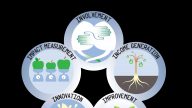Management, Management & leadership
Forget stability, choose sustainability
The second in a special series of posts by Graeme Reekie to mark the release of ‘Making a Lasting Difference – sustaining nonprofit organisations and their impact’.
When discussing sustainability, it’s important to be clear that we are not arguing for maintaining the status quo or being resistant to learning and change. Quite the opposite – non-profit organisations usually exist to change the status quo. Sustainability does not mean ‘sustained’.
Talking about sustainability can also sound like organisations are primarily interested in their own survival. This is dangerous because non-profit organisations exist to serve a purpose other than their own existence. Sustainability is not about keeping things going. Nowhere in your organisation’s constitution or founding documents does it say the organisation exists for its own sake, or to pay people’s wages – important though that is.
In the non-profit world, organisations exist to pursue a mission. Their job should be to do themselves out of a job. Although it’s common for organisations to say this, it’s much harder to live up to, particularly for boards and managers who commonly feel the responsibility of sustaining staffing, projects and the organisation above all else. However, sustainable organisations focus steadfastly on their goals, not survival; they seek funding that aligns with their strategies. Unsustainable organisations follow the money.
It might not even be desirable or necessary for an organisation’s work to continue. Many non-profits exist to build capacity so that other people, communities or organisations can provide for themselves. If you don’t withdraw from some projects or areas of work, you won’t have the capacity to reach new ones. And you’ll just create dependency. So, sustainability is fundamentally about making a sustainable impact, for example leaving a legacy so a project’s work or messages can carry on without it.
Keeping organisations going, keeping people in a job, or making sure projects are funded might all be important. But if organisations pursue them for their own sake they will, paradoxically but almost certainly, become unsustainable.
It is counterproductive for organisations to focus on sustaining their work for its own sake because:
- It pulls them off course, causing mission-drift (we call this the Octopus Paradox and will say more about it in a future article).
- They lose their identity, focus and purpose.
- They try to become all things to all people.
- Capacity gets stretched to breaking point as organisations do more work in more areas, each with different funding and reporting requirements.
- Organisations adopt unsustainable competitive practices, e.g. underpricing their work to win financially unsustainable contracts.
- It encourages dependency and the belief that people (or messages and campaigns) can’t survive without support.
- It’s commercially naïve: funders and supporters have a keen nose for organisations that are simply chasing the money.
Few funders fund activities, or even outcomes, for their own sake these days. Whether they call it this or not (and most don’t, yet), the trend is towards funding being a form of action research, investing in projects to generate learning about unmet needs and how they can be most effectively addressed.
Sustainability requires learning and change, not maintenance and stasis. In a changing world, the only certainty is that organisations that don’t adapt will fail. Stability is ephemeral and leads to stagnation.
That’s why innovation and learning are key to sustainability. One of the central themes of my book is that organisations need to continually learn and adapt. Learning what to sustain – and what to let go – is crucial.
Summary
The Change Paradox: Only by changing can organisations be sustained.
Principle: Sustainability does not mean ‘sustained’.
Practice: Learn, adapt and evolve purposefully.
This is an adapted excerpt from my new book, Making a Lasting Difference. Buy now

